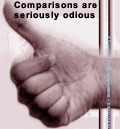|
 |
DIESELISATION |
HELL'S ANGELS
"We told you so!" Facts confirm our worst fears. Diesel passenger car sales are
touching the skies, Delhi’s car registration data shows. The annual incremental
growth rate since 1998-99 is a staggering 106 per cent, as opposed to 12 per cent for
petrol cars. The absolute number of diesel cars are less, but such a rate of increase is
phenomenal The problem: diesel fumes are also phenomenally toxic. What’s happened to
the city that went the CNG way to get the better of toxic diesel particulates? What awaits
other cities, similarly hit by diesel mania?
The Centre for Science and Environment (CSE) demanded a ban on diesel car registration in Delhi, way back in 1999. At that time, India was languishing under Euro 0 standards. Facts about the deadly effects of diesel emissions and evidence of its cancerous effects were pouring in. The big findings: diesel fumes had a lot more particles than petrol exhaust; these were several times more toxic. Globally, diesel had reached an impasse; the technology roadmap was still uncertain.
In 1998, California Air Resources Board branded diesel particulate matter as a toxic air contaminant. Subsequently it demanded stringent fuel-neutral standards 2004 onwards. It almost sounded as diesel’s death knell. But not in India. Oh, no. India at that time removed the direct subsidy on diesel, without a policy to eliminate cost advantages of diesel cars. You know the result. A thumping 300 per cent increase in diesel car models; customers spoilt for choice.
At that time, our regulators completely missed the message. They are missing it even today. Industrialised countries, driven by health concerns, have set stringent emissions targets to force innovation, force solutions to the problem of toxic diesel emissions. Near-zero sulphur diesel and advanced emission-control technologies are top priorities. Our government, meanwhile, has utterly failed to address the toxicity of poor-quality diesel.
India is inheriting many of the inconsistencies that plague European norms. Successive stages of European emissions standards, though tighter, are still lenient on diesel. The intermediate stages of these norms, though progressively tighter, allow diesel vehicles to emit more particulates and nitrogen oxides compared to petrol vehicles. Instead of following Europe’s mistakes, it is possible to skip a stage or two, and catch up with the state of the art standards. The government must intervene immediately to eliminate the price advantage of diesel cars. Make diesel vehicles pay for the environmental damages they cause. Formulate a fiscal policy to bring forward clean diesel standards in critically polluted cities in India.
Else, ban diesel cars. India’s people, and our health, cannot be taken for a ride on devil’s engines! Anumita Roychowdhury
